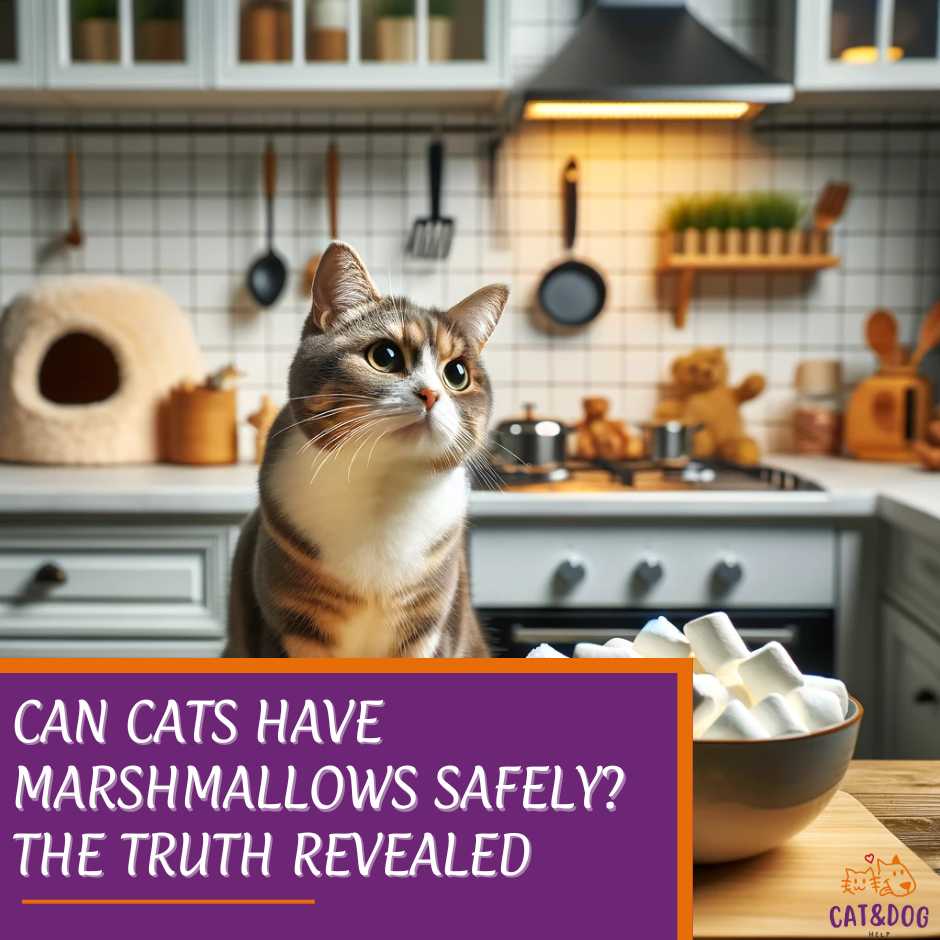The question here is, can cats have marshmallows?
No, cats should not eat marshmallows. Marshmallows are high in sugar and can be difficult for cats to digest.
Additionally, marshmallows can pose a choking hazard for cats. It is best to stick to cat-friendly treats and foods that are specifically made for their dietary needs.
When it comes to the quirky eating habits of our feline friends, you might find yourself wondering about some of the strange foods, such as marshmallows.
While these fluffy, sweet treats might be a delight for humans, particularly around a cozy campfire, it’s essential to consider whether what’s tasty for you is also safe treat for your cat.
Understanding what cats can and cannot eat, especially when it comes to potentially dangerous foods like marshmallows, is vital because their nutritional needs are vastly different from ours. (1)
In this blog post, we’ll explore whether cats can eat marshmallows and the potential risks associated with them. We’ll also discuss some alternatives to marshmallows that your cat would love. So let’s get started!
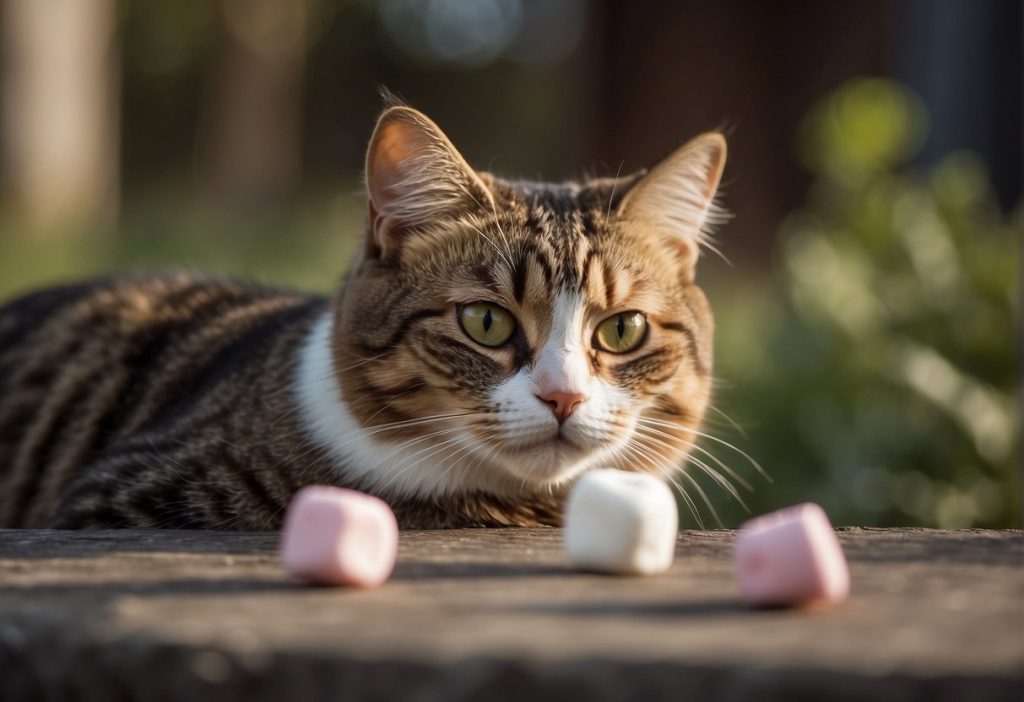
You might think that a small, soft marshmallow couldn’t do much harm, but the truth is, it offers no nutritional value to cats.
More than just being a sugary indulgence, marshmallows can pose risks to a cat’s health.
It might be tempting to share every aspect of your life with your beloved pet, but when it comes to their diet, it’s critical to stick to what’s best for their well-being. (2)
Key Takeaways
- Marshmallows provide no nutritional benefits to cats.
- Consuming marshmallows can be harmful to a cat’s health.
- Stick to cat-safe foods and avoid sugary human treats.
Nutritional Overview of Marshmallows
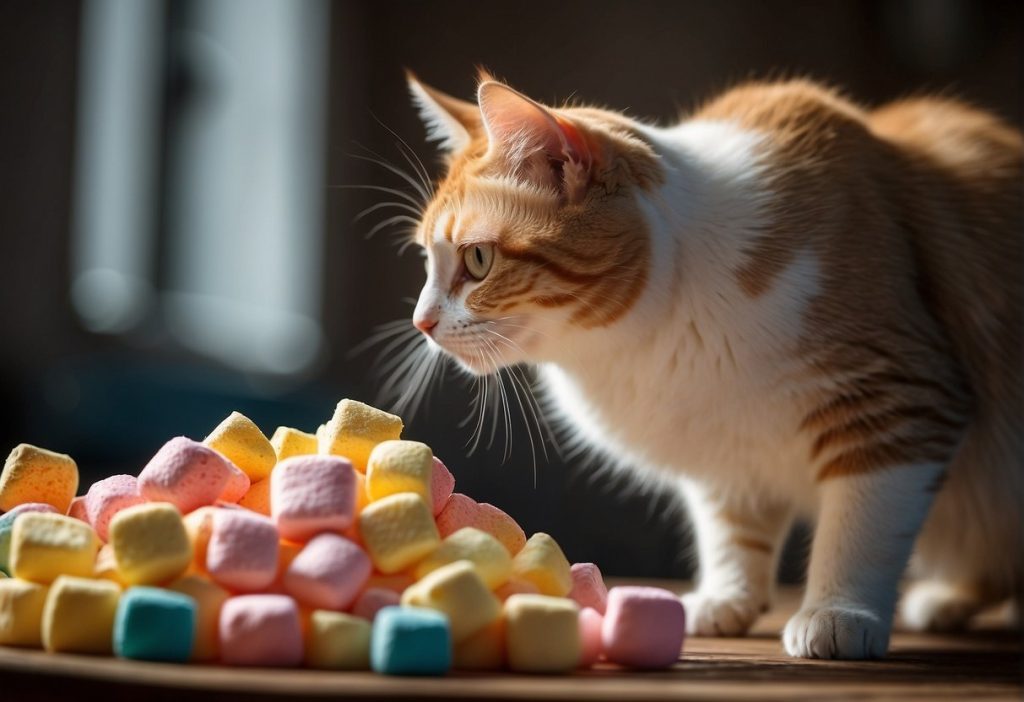
Hey, let’s take a peek at what marshmallows are made of, shall we? When you’re indulging in these squishy little clouds of sweetness, it’s just sugar, sugar, and more sugar.
In a single marshmallow, you’ll find about 4.1 grams of sugar and virtually no other significant nutrients. Even though they’re light on calories, about 25 calories each, marshmallows pack a punch on the sweet scale.
Now, let’s chat about what’s hiding inside these fluffy treats:
- Sugar: The main culprit for the rush.
- Artificial flavors: To jazz up the taste beyond just sweetness.
- Preservatives: Keeping them shelf-stable for long periods.
What happens when your furry friend eyes those marshmallows? Cats are obligate carnivores, which means their bodies are fine-tuned to extract nutrition from meat.
Marshmallows? Not so much. They lack the protein and essential amino acids your whiskered companion needs. (3)
Here’s a quick comparison of the nutritional value between a cat’s needs and what marshmallows offer:
| Nutrient Required by Cats | Present in Marshmallows? |
| Protein | No |
| Amino Acids | No |
| Vitamins | No |
| Minerals | No |
So, marshmallows are like giving your cat a bunch of calories and sugar without any of the good stuff they need to thrive.
Imagine running a fancy car on sugary soda instead of quality fuel—it just wouldn’t make sense, right? Stick to treats that match your kitty’s dietary requirements, and leave the junk food for your s’mores!
As a responsible cat parent, you should want to avoid feeding your cat sugary treats like marshmallows, as cats are obligate carnivores and need a diet that’s mostly made up of lean protein.
The amount of sugar in marshmallows could quickly result in your cat putting on weight and suffering from feline obesity.
Being a responsible cat parent means understanding your cat’s dietary needs and making choices that promote their health and well-being. (4)
It’s important to be mindful of what you add to your cat’s diet, and **junk food** should be avoided.
The Risks of Feeding Marshmallows to Cats
Short-term Health Concerns
Ever tossed a soft marshmallow in the air and caught it in your mouth? Bet you’ve considered if your kitty can do the same. But before you toss one their way, let’s think about what could happen.
- Upset Stomach: Cats have delicate digestive systems. Foods high in sugar, like marshmallows, can upset their tummy and possibly lead to vomiting or diarrhea.
- Allergic Reactions: It’s not common, but some cats may have an allergic reaction—sneezing, itching, or even more severe symptoms.
Remember Fluffy, the cat who snuck a marshmallow from the campfire treats? She ended up with a mild upset stomach—no fun for her or her human!
Long-term Health Risks
Sure, watching your furball savor a sweet treat may seem harmless, but sneaky dangers are lurking in the fluffiness of marshmallows:
- Obesity: Marshmallows are packed with sugar and empty calories. This can lead to weight gain over time. Did you know that obesity affects around 60% of domestic cats? (5)
- Diabetes: The risk of diabetes increases with obesity and a high-sugar diet, a combo that marshmallows certainly contribute to.
So, while your cat giving you the ‘eyes’ might be persuasive, remember that you’re helping them stay healthier by not sharing your marshmallows!
Addressing the Information Gap
Ever wondered if your furry friend can join you for a marshmallow treat? Let’s clear the air. Unlike the adventurous palates we humans have, cats have a more specialized diet.
Now, you might think, “It’s just one marshmallow, what harm could it do?” Well, it’s a bit more complex.
Digestive Differences: Cats are obligate carnivores, meaning their digestive systems are designed to process meat, not sweets.
Research indicates that cats are deficient in sweet taste receptors, which implies that sugary treats like marshmallows don’t appeal to them as they do to us.
This also means that their bodies aren’t equipped to metabolize sugar efficiently, potentially leading to obesity and diabetes.
Obese cats don’t just come from consuming marshmallows, but can also come from consuming too many carbohydrates, like rice.
However, if cats consume too much sugar, it can cause an upset stomach or diarrhea and can also contribute to obesity and high blood sugar levels. (6)
Therefore, it is best to avoid giving your cat sugary foods like marshmallows and other toxic foods altogether and opt for more healthy options.
Some cats struggle to digest lactose, the sugar in milk, and suffer diarrhea or GI issues. Chocolate is toxic to cats and should be avoided at all costs. Besides chocolate, there is still a lot of food that is dangerous for your cat..
Chocolate contains theobromine, a compound that is poisonous to pets. It can cause vomiting, seizures, and even death if ingested in large amounts.
Raisins and grapes are also toxic foods for cats as they contain a toxin that can damage their kidneys.
Ingestion of even small amounts of these fruits can cause vomiting, diarrhea, and abdominal pain, and pose a serious threat to their health.
Marshmallows and your Cat:
- Nutritional Value: None
- Choking Hazard: Yes
- Potential Toxicity: Xylitol
Did you know some marshmallows might contain xylitol, a sweetener that’s toxic to cats? That’s right, not only do marshmallows offer zero nutrients to your kitty, but they might pose a real health risk!
Many fellow cat owners have shared stories of their cats eyeing their marshmallow treats, but savvy owners know better than to share.
Cats typically show little interest in sweets, but their curious nature might make them want to take a sniff or even a nibble if offered.
Your takeaway? While sharing is caring, when it comes to marshmallows, it’s caring to not share.
Stick to cat-approved treats that cater to their carnivorous needs, and we can leave the marshmallows for s’mores and hot chocolate.
Remember, when in doubt about your pet’s diet, your vet is just a phone call away. They can provide personalized recommendations that ensure your cat stays both happy and healthy.
Safe Alternatives to Marshmallows for Cats
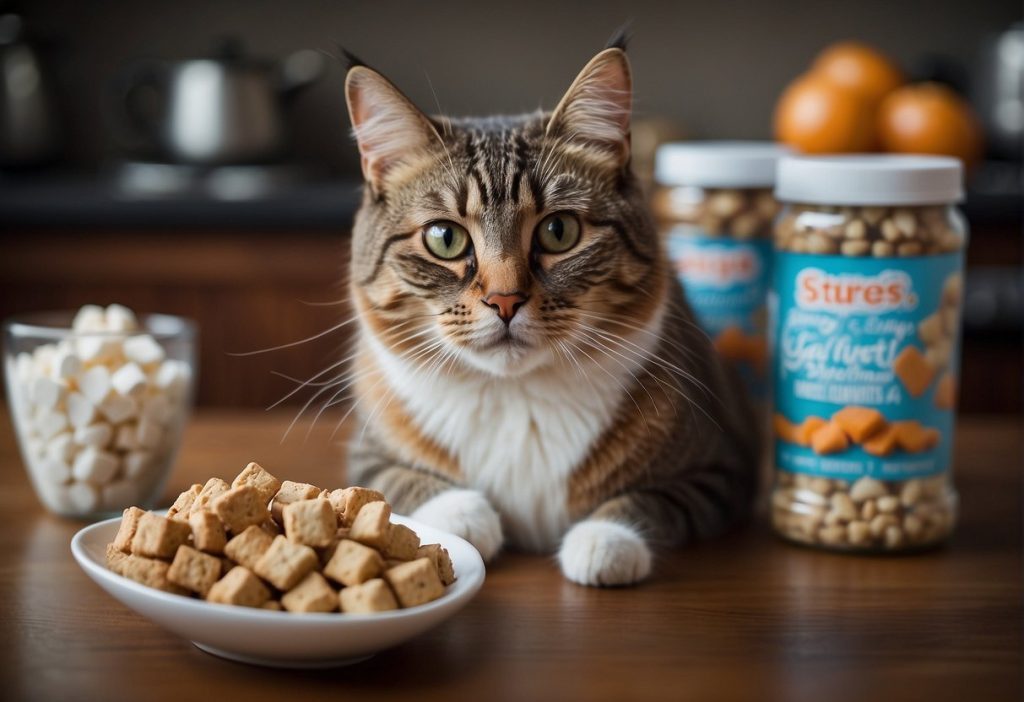
Are you searching for something special to treat your furry friend? Marshmallows are a no-go, but don’t worry – there are plenty of cat-friendly treats that will have your kitty purring with delight!
Healthy Treat Options
- Cooked Meat: Think of bits of chicken or turkey.
- Fish: A small serving of tuna or salmon is often enjoyed.
- Commercial Cat Treats: Always ensure they’re vet-recommended.
Remember, moderation is key! Too much of even a good thing isn’t beneficial.
How to Choose Safe Treats Choosing the right snacks for your cat isn’t just about taste:
- Read those labels! Look for natural ingredients.
- Beware of fillers. Avoid treats packed with unnecessary grains or artificial additives.
- Check for toxic ingredients. Onions and garlic are no-nos to cats.
By treating your cat with these safe alternatives, you’re ensuring a happy and healthy munching experience.
Keep it varied to keep them interested, and always double-check with your vet if you’re unsure about a new treat. Your kitty’s health and safety are what matters most! 🐾(7)
Expert Opinions and Veterinary Advice on Can Cats Have Marshmallows
Have you ever watched those internet videos of cats making funny faces when tasting new foods? They’re adorable, right?
But when the snack in question is a marshmallow, vets would not hit the ‘like’ button. Here’s why.
Veterinary Perspectives on Cat Diets:
When it comes to what you’re feeding your furry friend, veterinarians have a simple rule of thumb: stick to cat food.
Cats need a diet high in protein and low in sugars and carbs, you also have to understand how much time to feed your feline friend.
Interviews with vets usually boil down to a big thumbs-down on human treats, especially marshmallows.
Why are marshmallows bad news for your cat? Here’s the scoop:
- Sugar Shock: With a whopping 4.1 grams of sugar in a single marshmallow, you’re giving your cat a sugar hit that their body isn’t designed to handle.
- Calorie Count: That marshmallow isn’t just sweet, it’s also packing about 25 calories—that’s roughly 10% of your cat’s daily caloric intake!
- Sodium Spike: Too much sodium, found in abundance in marshmallows, can be harmful to your cat.
Research on Feline Nutrition:
Recent studies on feline diets reinforce the vet’s advice: cats thrive on meat-based diets. Cats lack the necessary enzymes to break down and use carbohydrates effectively.
So those fluffy white sweets? They won’t provide the right kind of energy for your cat.
To sum it up, marshmallows are a no-go. If your curious cat accidentally swipes a marshmallow, it’s not the end of the world—but don’t make it a treat.
Your cat may have nine lives, but they rely on you to make each one as healthy as possible!
Interactive and Engaging Content
Have you ever eyed your fluffy buddy as you snack on marshmallows and wondered, “Can my cat share this treat?” You’re not alone! Let’s play a game of Myth vs. Fact to sort out the marshmallow madness.
Myth: A little marshmallow won’t hurt your purring pal.
Fact: Marshmallows offer no nutritional value to cats and can be harmful.
Cats lack the enzyme to break down sugar properly, making marshmallows a bad idea for their diet. Plus, these sugary puffs could lead to obesity and diabetes in felines. Not so sweet after all, huh?
Myth: It’s fun to watch cats eat sticky treats!
Fact: Sticky foods like marshmallows can become a choking hazard.
Here’s a safer treat table to keep the fun alive:
| Safer Treats | Why They’re Better |
| Freeze-dried meat/fish | High in protein, no added sugars or harmful ingredients. |
| Catnip | Totally safe and can provide entertainment and relaxation. |
Remember, while sharing food seems like a bonding moment, sticking to cat-safe treats is the real way to show love.
Who needs marshmallows when you can watch your feline friend go wild for a pinch of catnip or a bite of freeze-dried chicken?
Let’s keep our cuddly companions healthy and happy! Skip the sweets and go for those perfectly suited snacks.
Your furry friend will thank you with headbutts and purrs, and honestly, isn’t that sweeter than any marshmallow? 🐾
Quick Recap
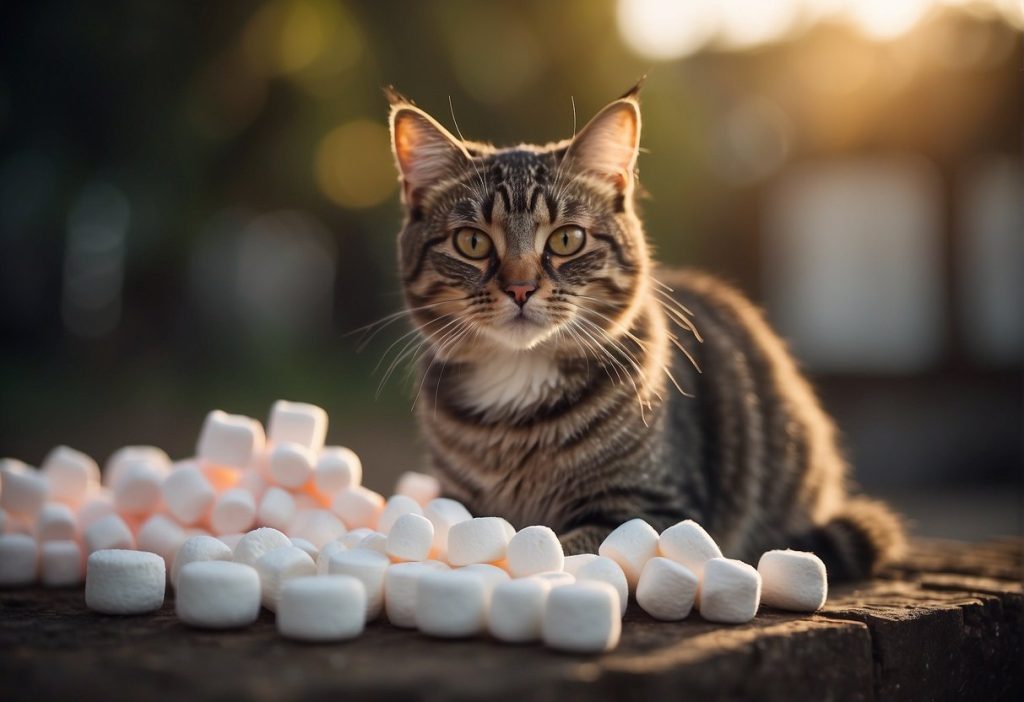
Wondering if you can treat your feline friend to a fluffy marshmallow? Let’s break it down:
- Safety: Marshmallows are not toxic to cats. However, they’re a choking hazard and offer no nutritional value.
- Nutrition: Marshmallows lack essential nutrients that cats need, making them an inappropriate snack.
- Risks: Besides choking hazards, marshmallows can lead to obesity and diabetes due to high sugar
content.
Here’s what you should remember:
| Do Cats Eat Marshmallows? | Recommendation |
| No, they don’t. | It’s best to avoid it. |
Feeding cats marshmallows occasionally isn’t beneficial, and regular consumption can harm their health.
Stick with cat-safe treats that are meant for them. Have a chat with your vet if you’re looking for great suggestions – they’ll know what’s up!
If your kitty does sneak a marshmallow, don’t panic. Keep an eye on them and look out for any signs of distress. If you suspect they’re not feeling great, a visit to the vet is in order.
Remember, when it comes to treats, it’s better to be safe than sorry. Treats should never be more than 10% of your cat’s daily intake. Stick to this guideline to ensure your cat stays happy and healthy!
Frequently Asked Questions
Curiosity didn’t just bother the cat; it’s got you thinking about treats, allergies, and safety. Here’s a chew on that.
What are safe snacks for my feline friend if marshmallows are off the menu?
You can opt for cat-friendly treats that are specifically formulated for your furry friend’s nutritional needs.
Think lean meats like chicken or turkey, which are high in protein and low in fat.
Can marshmallows cause allergic reactions in cats?
Though not common, cats can have an allergic reaction to any food, including marshmallows.
Keep an eye out for signs of an allergic response such as itching or gastrointestinal upset.
Is a mini marshmallow treat harmful for my cat, or should it be avoided at all costs?
Even a mini marshmallow isn’t a good idea for your kitty. They offer no nutritional value and can be a choking hazard or cause an upset stomach.
We know sweets are a no-go, but what specifically makes marshmallows bad for cats?
Marshmallows are high in sugar and contain no essential nutrients for your cat. They can lead to obesity, dental issues, and potentially diabetes with regular consumption.
Are sugar-free marshmallows safe for cats?
Sugar-free marshmallows often contain xylitol, which is toxic to cats. It’s best to avoid giving them any kind of marshmallow, sugar-free or not.
What should I do if my cat accidentally eats a marshmallow?
Keep an eye on them for any adverse reactions. If you notice anything out of the ordinary, contact your veterinarian.
What are some cat-friendly alternatives to marshmallows?
Consider healthy alternatives like small pieces of cooked fish or meat, commercial cat treats, or a bit of canned pumpkin (not the pie filling, just plain pumpkin) for a fiber-filled treat.
Remember, what’s a treat for you isn’t necessarily safe for your kitty. Always prioritize their health and dietary needs over the cuteness of sharing your snack.

